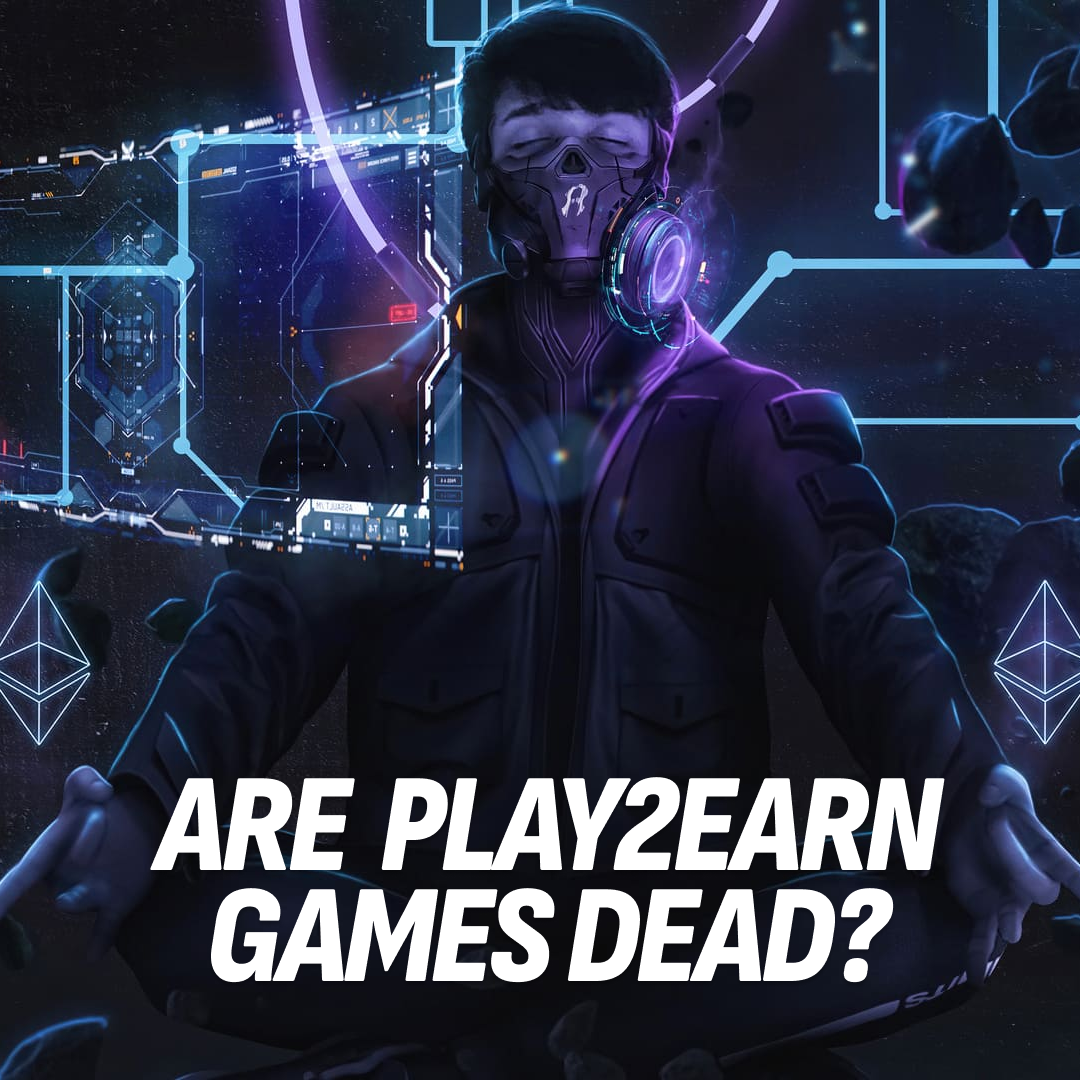The trend of moving away from the centralized structure of web2 has gained momentum, leading to a push for complete decentralization of web content. However, this has also created opportunities for unregulated and speculative approaches to implementing this new trend.

The gaming industry has been particularly impacted by this trend, with the emergence of the controversial play-to-earn (P2E) tag fueled by the popularity of cryptocurrencies. In 2023, the question remains whether play-to-earn is still relevant and whether it was ever intended to be a sustainable model in the first place.
The Promising Future of a Free and Decentralized Web3
Web3 was envisioned as a solution to address the problems caused by the corporate dominance of web2, currently led by monolithic technology companies, also known as 'big tech.' As a result, there has been a growing interest in exploring alternative methods to regain control. Web3 games have emerged as one such alternative in the gaming industry. However, whether or not they are the right solution depends on various factors. We can differentiate between two primary approaches to blockchain gaming.
Play2Earn and Play&Earn: Different Approaches to Earning in Crypto Games
The first model is a straightforward play-to-earn approach, in which games are not played for the sake of enjoyment but purely for the purpose of earning. This model promotes a culture of mindlessly chasing after highly inflated cryptocurrency or NFT trading opportunities rather than focusing on the gameplay experience itself.
Sure, from a certain point of view, play2earn might seem tempting for both developers and players. Crypto games and Play-to-Earn gaming has become increasingly popular in countries like the Philippines, Vietnam, Malaysia, and Venezuela. For instance, Axie Infinity has particularly gained attention, with 350,000 active users every day. By playing this game, users could earn rewards in the form of Smooth Love Potions (SLP).
In July 2021, players earned an average of 150 to 200 SLP per day, which equates to approximately $53.50. As a result, players could earn an average of $1,500 per month, exceeding their full-time job salaries. However, after its 2021’s peek, the token price plummeted and hasn’t recovered yet.

Splinterlands is yet another highly popular crypto game. How did its token evolve? The chart of the Splintershards (SPS) token strikingly resembles the fate of Axie Infinity, with its peak in 2021 and subsequent and long-lasting downfall.

Another example could be potrayed o Decentraland's MANA token. With the ATH price at $5.1991, it dropped to bare $0.5 and hasn't recovered yet. MANA still struggles to reach at least a single dollar worth.

After all, the list goes on. Just take a quick look at all-time data of similar projects on CoinMarketCap to see my point in red numbers.
Play-to-Earn is faulty by design
Despite the initially enticing prospects, the primary issue of play-to-earn games is the lack of quality and consistency, which leads to player boredom and ultimately spells doom for the game.
This vicious cycle is characterized by declining player numbers, reduced revenue, falling token, and NFT prices, a diminishing return on investment for game development, and, ultimately, the failure of the entire project.
At the end of the day, play-to-earn players are left with no other choice but to switch to another up-and-coming P2E project or leave the whole concept behind. It's safe to say that the fate of the most of the typical P2E crypto games is tied to the unfavorable project journey with the same outcome, as displayed below:

Quality First Ensures Sustainability of Blockchain Games
An alternative approach to web3 gaming involves striking a balance between the quality of traditional gaming and the freedom that decentralization provides. This approach aims to offer players true ownership of in-game assets and the ability to organize esports leagues without relying on a third-party authority. The focus is on delivering a high-quality game that motivates players to play for the sake of enjoyment, with earning potential serving as an additional benefit.
Assessing the Potential of Blockchain Games: Is the Future as Promising as it Seems?
Despite the promising forecasts, even successful web3 game titles must struggle to maintain their foothold in the market. A recent study on the Global Blockchain Game market indicates that it is expected to grow from $4.6 billion in 2022 to a staggering $65.7 billion in 2027, with a Compound Annual Growth Rate (CAGR) of 70.3%. This growth is being fueled by increased investment in blockchain gaming. However, the industry faces challenges when it comes to the public perception and awareness of NFTs and blockchain technologies, which may impact its long-term sustainability.
The potential growth of the blockchain gaming industry may be limited by the lack of interest among traditional gamers, as the majority of active players still operate within the confines of web2. According to a survey, only 40% of players in the US, UK, and Indonesia are willing to try out blockchain-based games. The main reasons for their reluctance include concerns about the quality of the games, insufficient knowledge of crypto and NFTs, fear of losing money, and the costs associated with the entry.
Considering these factors, it is crucial to bring high-quality AAA games to the blockchain gaming market and increase awareness among mainstream players in order to fully realize the predicted growth of the industry.
The Democratization of Professional Gaming in Web3 - eSports as a Key to Success
Numerous false promises have been made regarding the ability to earn quick cash by playing games, but this approach does not address the underlying issue. In such cases, the only so-called "reward" for spending time on low-quality games is a digital number that holds no actual value.
This does not necessarily mean that the entire cryptocurrency-powered model is futile. If a game can compete with other high-quality web2 titles, then players may be motivated to continue playing based on the enjoyment of the gameplay rather than empty promises of quick income.
The key to implementing a successful and fair earning model is to create a high-quality game that allows players to truly own the assets they earn or purchase and to organize and participate in tournaments without any third-party interference. Therefore, the earning aspect should not solely depend on playing the game but rather be an additional benefit to the overall gaming experience, as proposed by Ashwin Lim’s article on the demise of the play-to-earn.
We believe that the optimal model for success is one that involves both playing and earning. Rather than tying rewards solely to the amount of time spent on screen, a more effective approach would be to base achievements on players' skills. Such an approach would enable the development of a sustainable system for rewarding players, which would create opportunities for anyone to excel.
This belief naturally leads to the implementation of esports tournaments in the Web3 gaming ecosystem, as explained by our CEO, Rastislav Bakala:
“QORPO Game Studio is enthusiastic about challenging the current centralized model of esports. We plan to organize sponsored tournaments with significant prize pools, which will provide opportunities for players to compete at a high level without requiring long hours of training or traditional sponsorship.”
“Additionally, players will be able to arrange their own tournaments and generate income from esports. Overall, QORPO aims to make esports accessible to a wider range of players and create a more inclusive and decentralized esports community.”
Moving Beyond Play-to-Earn: What’s the Future of Play-to-Earn Crypto Games?
Ultimately, the shortcomings of play2earn crypto games are not due to the games themselves but rather to poor execution and the inefficiencies of non-functioning game economies. So is play-to-earn dead?
The play-to-earn model, which solely rewards players for their screen time, is dead, but blockchain gaming continues to grow. The success of any web3 game title now depends on its high-quality gameplay, competitive graphics, and functional economy model.
Apart from having attractive graphics and engaging gameplay, the key element for a successful web3 game is to provide a user-friendly interface that incorporates the benefits of blockchain technology. It's essential to ensure that traditional gamers don't feel intimidated by the newness of the web3 ecosystem.
Ready to experience the paradigm shift in web3 gaming? Join our gaming ecosystem and prove your skills in competitive tournaments and heated challenges.
Credits
Blog By Pavel Soral
Apr 11, 2023, 6 min

